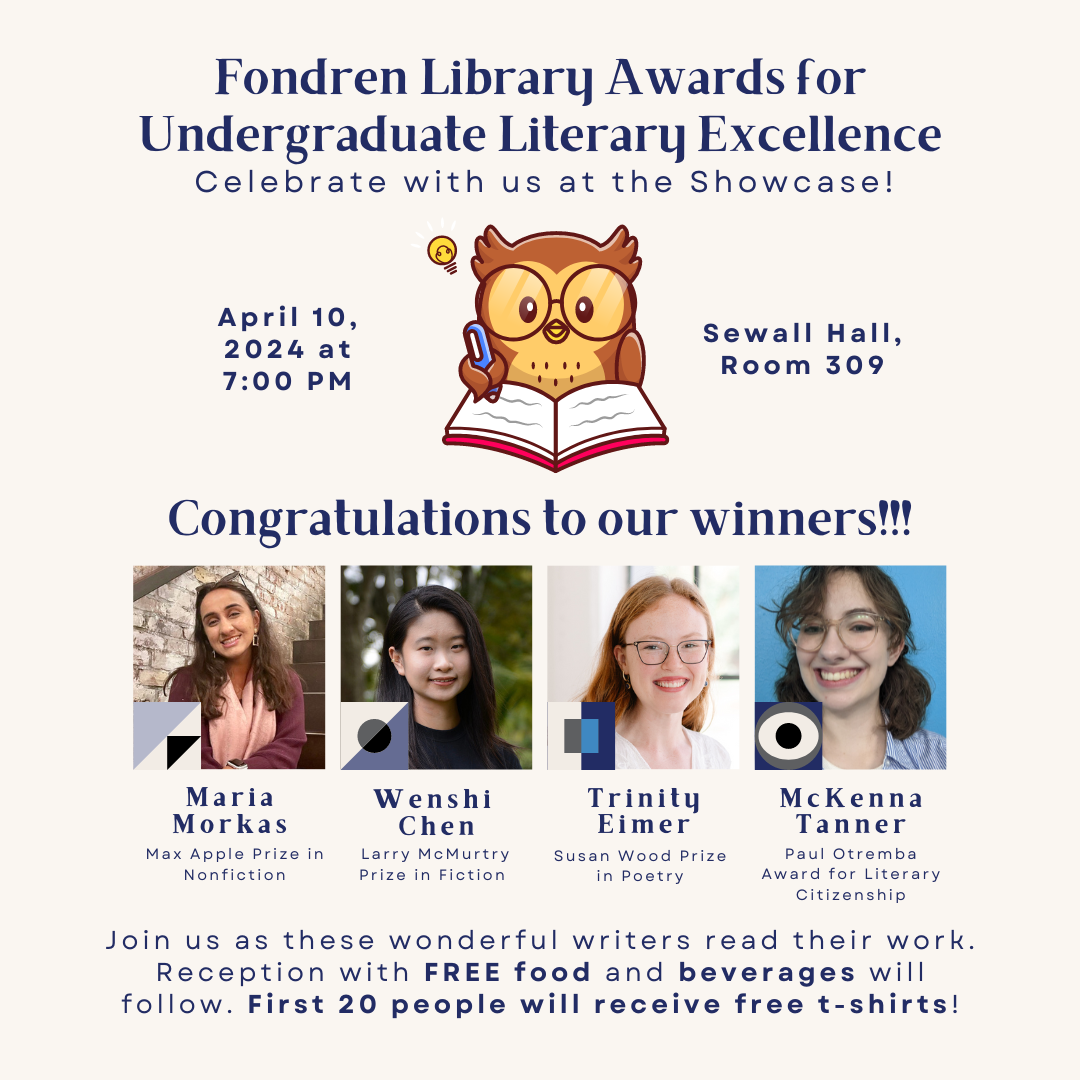
We are excited to announce the winners of the Fondren Library Undergraduate Creative Writing Awards.
The winner of the Larry McMurtry Prize in Fiction is Wenshi Chen.
The winner of the Max Apple Prize in Nonfiction is Maria Morkas.
The winner of the Susan Wood Prize in Poetry is Trinity Eimer.
Please save the date to hear the prizewinning works at the Fondren Undergraduate Creative Writing Showcase on April 10, 2024 at 7:00 PM in Sewall 309!
In addition, this year Fondren Library begins a new collaboration with the Rice English Department to bestow the Paul Otremba Award for Literary Citizenship. This award, given in memory of the beloved teacher and poet, Paul Otremba, celebrates an outstanding graduating senior who embodies Paul’s spirit of literary service, engagement, and activism. It comes with a $1000 prize. Selected by Rice Creative Writing faculty members, this year's winner is McKenna Tanner.
The judges write:
McKenna Tanner is a senior double-majoring in Psychology and English with a concentration in Creative Writing. A champion for the literary arts on campus, McKenna has been a mainstay for The Rice Review, serving for the last two years as one of the magazine's dauntless co-editors-in-chief. In addition to her commitment to writers on campus, she has worked for the nonprofit publisher, Bloomsday Literary, using her editing and design skills to help amplify the work of queer and trans poets in particular. She has also contributed to significant projects in the well-being and mental-health space through her internships with Norton Professional Books. McKenna's special combination of thoughtfulness, artistic ambition, and generosity is reminiscent of the poet Paul Otremba who displayed all of these qualities in abundance.
Thank you to the Hobby Family whose generosity has funded these awards, to our Creative Writing faculty for your partnership, and to all the students who submitted their amazing writing.
Below are judges' citations for the creative writing awards. Each judge is an established professional writer in their genre, selected by our Creative Writing faculty.
Ian Stansel writes of Wenshi Chen's story, "Her":
“Her” unfolds with a strange magnetism. What, in a more sentimental version of the story, might have seemed slight or even maudlin feels instead absolutely pregnant with portent. Told with a voice unnervingly matter-of-fact, the story pulls the reader forward towards an end that is utterly haunting. This is a story that moves from the quotidian to the thrilling with admirable restraint and remarkable emotional force.
Lars Horn writes of Maria Morkas' nonfiction piece, "A Trip to Jerusalem":
Weaving between elegant scene work and nuanced reflection, Maria Morkas offers a compelling exploration of faith, place, and politics. The writing vividly conjures the streets of Bayt al-Maqdis and Hebron, as the narrator meditates upon her own devotions as a Muslim in the US and those of Muslim women in Gaza. In its intellectual and emotional presence, “A Trip to Jerusalem” deftly moves between intimacy, sorrow, despair, and even hope, which is to say: it moves as prayer.
Jennifer Chang writes of Trinity Eimer's poems:
An effortless dynamism gives these deft lyric poems a heady music that I find irresistible. In “love in medieval times: 1,” the speaker imagines another potential lover as she dances and kisses her boyfriend in a Houston club. All in the course of one sentence. There’s nothing glib or trite about this experience of youth; rather, we witness a person caught up in sensual experience, the urgent matter of being in the body and being attentive. In “love in medieval times: 2,” that attention focuses on time, as a rhythm and a pattern of fractured syntax. What measures that time, the poet soon makes clear, is the other, “two little mouths,” that is almost within reach. Swift, unaffected, lightly adorned, quietly intense, these poems exude an elegant sense of line and diction and are poised at the precipice of self-knowing.